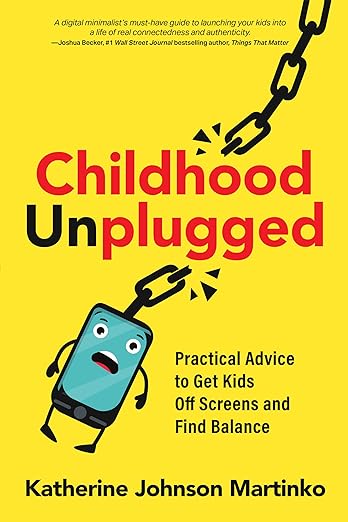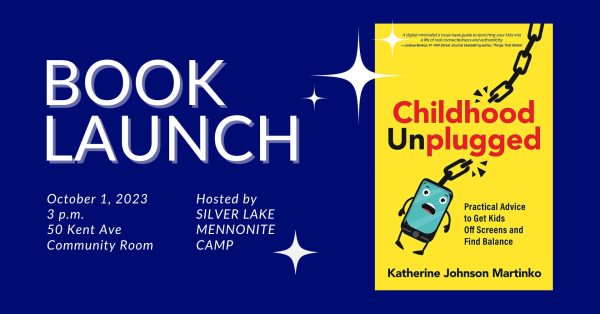Q&A with CHILDHOOD UNPLUGGED author ahead of SLMC book launch

Silver Lake aims to be a place where people feel free to disconnect from devices and be present with nature and community. As an environment that practices digital minimalism, SLMC is looking forward to hosting a book launch for CHILDHOOD UNPLUGGED by Katherine Johnson Martinko on Oct. 1 at 3 p.m.
Join us in the Community Room at 50 Kent Ave, Kitchener for an opportunity to hear Katherine speak, ask questions, and grab your own copy of the book. Childcare is provided!
Katherine’s book focuses on providing adults with practical advice on getting kids to spend less time on screens and more time playing and interacting face-to-face. During her writing career the former senior editor of Treehugger has written extensively about free-range parenting and low-impact living.
We sat down with the author to discuss CHILDHOOD UNPLUGGED, her own family’s experiences with digital minimalism, and interesting research about in-person socialization.

Who is this book for?
Good question. I wrote it for people who are worried about how much time their kids are spending on devices, or who have young kids and they don’t want their kids to get too hooked on devices based on what they’re seeing around them. It can also be for educators. It could be for grandparents. It really could be for anybody who has children in their lives whose digital media habits are concerning them.
There are many people out there who are not concerned about their kids’ digital media habits. It is not the goal of this book to try to convince people of why they should maybe pull that back a bit or wrang it in in some way. […] The goal of it is basically to inform and to inspire and to give people really practical tips to take action.
You’ve written a lot about sustainable living, but what inspired you to write a book about devices and childhood specifically?
It’s a good question because I got started with sustainability and environmental news. As part of that, I started writing a lot about the importance of outdoor play for kids and spending time in nature. Then I started realizing that devices are getting in the way of a lot of kids going outside and playing. I think that when you have something as distracting as an iPad or video game console, or whatever it may be in your house, you’re going to be less inclined to spend those hours outside that you need to be spending outside because it’s just so good for kids developmentally, psychologically, just in every way. It makes us better people when we’re outside. So, I think it was born out of that link.
Also, I was researching a lot of independent play like free-range parenting. I was involved with Lenore Skenazy’s work. She wrote the foreword for my book. She runs the Let Grow foundation. So, all of that I’ve been writing about for Treehugger. It came together when I realized that I had a bit of a unique take on parenting and screens. So that’s how the book idea came.
Why is child-directed play such an important part of childhood and how does that benefit later in life?
Yeah, absolutely. Play is how children rehearse for life as adults. It is their practice. It’s how they work through a lot of big questions and confusing moments in their lives. It’s how they develop interactional, inter-relational skills with other people, negotiation, agreeing to change rules to accommodate certain people’s abilities, accusing people of cheating and working that out and resolving it. There are just so many rehearsals for real life.
Kids are now spending so much time on devices. The average daily amounts are five and a half hours to almost nine hours a day, on average outside school hours, that preteens and teens are spending on devices. That’s just a whole lot of time that kids cannot spend playing because they’re too busy on their devices. I just think that we are failing to give our kids opportunities to engage in these really formational activities that they desperately need in order to become well-rounded adults one day.
I think, too, boredom is important. We know that boredom’s a richly creative state and kids need boredom in order to develop interests and hobbies and skills, and develop the capacity to be able to come up with things to do on their own. Brainwaves, these lightning bolts of inspiration. All these things come from those times of solitude and emptiness in our lives. Kids need them too. Right now, they’re just overstimulated and it’s not happening as much as it used to.
In your research for this book, what did you find surprising, or what stood out to you?
Actually one of the most intriguing pieces of research that I’ve been thinking about since the book came out — I actually just read this recently, and I ended up writing a blog post about it on my Substack — but there’s a new study that came out recently that found that mental health outcomes are tied to the age at which a child gets their phone for the first time. So, the younger you are when you get your first phone, the worse your mental health outcomes likely are going to be. This was a study of 28,000 young people. But what was interesting is that the researchers think that the worst mental health outcomes come from a lack of face-to-face interactions with other people.
What they said, essentially, is that up to 2,000 hours a year are being displaced by devices that would normally be spent on face-to-face interactions with family and friends. That just blew my mind when I thought about 2,000 hours that your kid could be looking into your eyes or their siblings eyes, reading facial cues and learning smile cues from a parent, or developing empathy by reading facial expressions. You need to be looking at other humans in order to learn how to read them and to feel compassion and to feel empathy and all of these emotions that are just so critical to a well-functioning world. When you give kids devices — I mean, adults are doing the same thing — you’re not looking into people’s faces anymore. So that was pretty profound.
What have been some of your personal highlights that you’ve had with or seen from your kids, who have been raised screen-free?
No one’s ever asked me that. I have to think about that one for a second.
Their ingenuity at entertaining themselves. When you take away the option of the device, the kids really do come up with incredible things to make and to do.
For instance, my youngest son… He’s eight and he had a friend who came over a couple of weeks ago, and they decided to build a squirrel house. I had no idea what a squirrel house was. They came up with this idea and they proceeded to spend four hours in our backyard. They built this gorgeous miniature structure out of twigs and sticks and moss, and then they made an all-you-can-eat squirrel buffet with acorns. It’s still standing and it’s just really beautiful. People come and they’re like, ‘What is that in your yard?’ Well, that’s our squirrel house. The boys made it.
The little boy that [my son] made it with actually came over the very next day so they could build an addition to it. They were just so into this game. That’s just one example, but also the art projects, the music projects, the physical fitness projects, and the obstacle courses they make for themselves. I feel like part of getting kids off devices is also willingness to embrace chaos at home — chaos within reason; not complete insanity — but there’s mess, there’s noise, there’s busyness, there’s experimentation, there’s limit pushing. But the result is this really richly creative environment where kids are constantly coming up with cool ideas and really impressing me with what they have the capacity to do.
Some parents might just limit the amount of screen time for their kids, but what inspired you to raise your own kids screen-free?
So, I should clarify. We’re not 100% screen-free. I say that we are digital minimalists. We don’t have TV, the kids don’t have phones, they don’t have iPads. But my husband and I do have laptops, obviously. I’m on one right now. He and I each have a smartphone. The kids cannot access our smartphones, but they are allowed to watch movies periodically. My oldest son is in high school. He was just given a laptop at the beginning of Grade Nine that he’s expected to use every single day for class and to login into things. I feel like saying, “screen-free” isn’t quite accurate. Digital minimalist parenting is a little bit more apt, perhaps.
However, I would say that digital media is highly addictive, so I find that it’s almost easier to not fight about it than to fight about it. I think that parents really set themselves up for challenges when they give their kids maximum amounts of time that they could do each day. Kids are always going to be asking for that. They’re always going to be pushing back and begging for more and being angry when it’s taken away. There are all those meltdowns and tantrums that come from the dopamine surges. We know this is an actual neurological thing.
My approach has always been no screens. I mean, we have them in the house, and on rainy days or when the weather’s really bad or if I genuinely really need two hours of silence and “You guys just have to go watch a movie and do your own thing.” And for them in those cases, it’s a special thing. It’s very rare and it’s very special and they absolutely love it and they get really excited.
So, I think it’s better to limit it than to not limit it. But I often think that parents could maybe benefit from more elimination than just limits and they’ll actually make their own lives easier in the process.
How have you managed to find the balance of using devices for work and your own life while maintaining boundaries for your kids?
It’s tricky because I think that parents have to model the screentime habits for their kids. It’s really not fair to say you can’t have this device and yet, and if you’re a parent, you can’t be on it constantly. That’s just not fair. Your kids are not going to take your lesson seriously once they actually get a device. They’ll just copy what they’ve seen you do so because that’s what kids always do.
I think that my husband and I strive to not be on our phones when we’re around our kids. Some advice that I read in the past is to narrate what you are doing when you pick up your device. There are times that I’ll grab my phone and explain to my kid I’m looking for a recipe for something that I’m making for dinner, or we have to FaceTime with grandma right now because I told her I would call today and we haven’t called her yet. It’s more of, “This is why I’m doing it.” This is a tool that is helping me as opposed to “I’m just checking my Instagram for the fifteenth time today to see how many likes I got.” That obviously sounds ridiculous when you explain it to a child.
We also participate in Tech Shabbat sometimes. That’s the idea that was popularized by Tiffany Shlain where a whole family goes offline for 24 hours every single week. We enjoy that very much. We power down all the devices, including the computers, phones. We’re basically unreachable for those 24 hours and we just do stuff together as a family. So that can be a really good way to set an example for kids.
I think it’s important as parents though, just to embrace offline hobbies and interests so that your kid sees there’s a life worth living off screens. We do a lot of hiking. We do a lot of reading. We do a lot of entertaining. There’s just a lot of activities that don’t involve devices that the kids witness us participating in and come along with often. That that sets good behaviours for them.
What kind of pushback have you heard about these screen-free philosophies and what do you say in response to them?
The biggest pushback is actually regarding my oldest son, who’s 14 now and he’s now in high school, and he still doesn’t have a phone. A lot of people view that as isolating him and causing him to not feel connected socially. That’s always interesting. My son and I talked about it extensively. It is an ongoing conversation, and it’s something that he understands even if he doesn’t agree with. He would prefer to have a phone than not, and he does bug me about it.
At the same time, I think it’s a bit of a fallacy that these phones are actually connecting kids. I think that they’re actually creating a lot of isolation, and they’re driving loneliness rates up. Kids are not connecting at school because everyone’s staring at their phones. They’re not even talking to the kids sitting around them in their cafeteria. My son has told me this himself. Everyone’s just on their devices. They’re all listening to music on their air pods. They’re not conversing, so I think that the idea that you should give your kid a phone so that he can be connected is wrong. It’s just blatantly wrong.
The reason kids need phones obviously is to, ideally, be able to set up social get-togethers to do in person. I let him use my phone if he needs to text friends so they can go on a bike ride or they can go to the beach together and they can go do other things. I certainly try to facilitate that.
I think that’s a big question, though, that people need to grapple with more. It’s sort of a knee-jerk reaction that you give a kid a phone so that they can feel connected, but what we’re really seeing is that the kids are not connecting. The cyber bullying is increasing and it’s coming home with the kids from school too. They don’t ever get away from it. It’s in their bedrooms at night when they’re looking at their phone. I think that there’s a lot of downsides. It’s just not really being examined critically. So, that’s an issue.
I do think about the isolation issue. I think that eventually, when he’s a little bit older, if he wants to get social media, he could get that but only access it on a desktop computer at home. That’s some advice that I read somewhere. I think it’s really smart because the kid can still feel connected within the social network, but it’s just not in their pocket. It’s not tempting them every single minute of the day. There are workarounds. There’s a phone that’s coming to Canada this year called a light phone. It’s currently only available in the States. And it looks like a smartphone. But it doesn’t support any kind of social media apps or Internet browsers […] The light phone has calling and texting capacity. It’s got podcasts, got music, directions. I’m not sure how it has directions if it doesn’t have internet, but whatever. There are workarounds. You can still connect with your kid and be able to communicate with them. Allow them to talk to their friends about things that matter but maybe don’t get sucked into that whole nasty group-chat, social-media vortex that is actually wreaking havoc emotionally and socially on them right now.
What was one of your favourite parts about writing CHILDHOOD UNPLUGGED?
My favorite part was probably the actual writing. But that’s also the hardest. It’s by far the hardest. It’s also the most fun. I spent years, in a way, writing about the subject and sort of preparing for it. Then when I signed the contract with the publisher, I went into an aggressive research mode where I was reading all kinds of books and rereading books that I knew were going to be helpful. They had all the quotes and all the references that I needed. And then I started conducting interviews and I interviewed dozens of people for this book, and transcribed all those interviews. There’s that feeling when you’re writing a book where it’s all piling up, like you’ve got all the material but then you know that inevitable moment will come when you have to sit down and just sort through it and turn it into an actual digestible manuscript. So, I would say, feeling that I was filled to the brim with research and amazing resources from all of the quotes that I got from people I interviewed and whatnot… It was really special to suddenly sit down and put the words down on paper. But hard, too.
What are your hopes now that CHILDHOOD UNPLUGGED is out in the world?
I guess I would love to see this idea of digital minimalism with kids be normalized. I still think that my family’s approach is really seen as quirky and unusual. Some people think it’s crazy and weird. Others think it’s amazing and inspiring, but I just wish that there were more families that were doing it. I think that the book is inspiring people to do so because I’ve been hearing from readers who have read it and then they reached out and say, ‘You know, I realize now that I can delay my child’s smartphone ownership, or I can say, no, you’re not playing video games right now. You’re going outside to play.’ So, I think that would probably be the biggest goal. I don’t think it’s going to start a movement or anything. That would be really amazing if it did, but even if just a few families realize that they can preserve their kid’s childhood a little bit longer, I will feel like it’s been a huge success.

